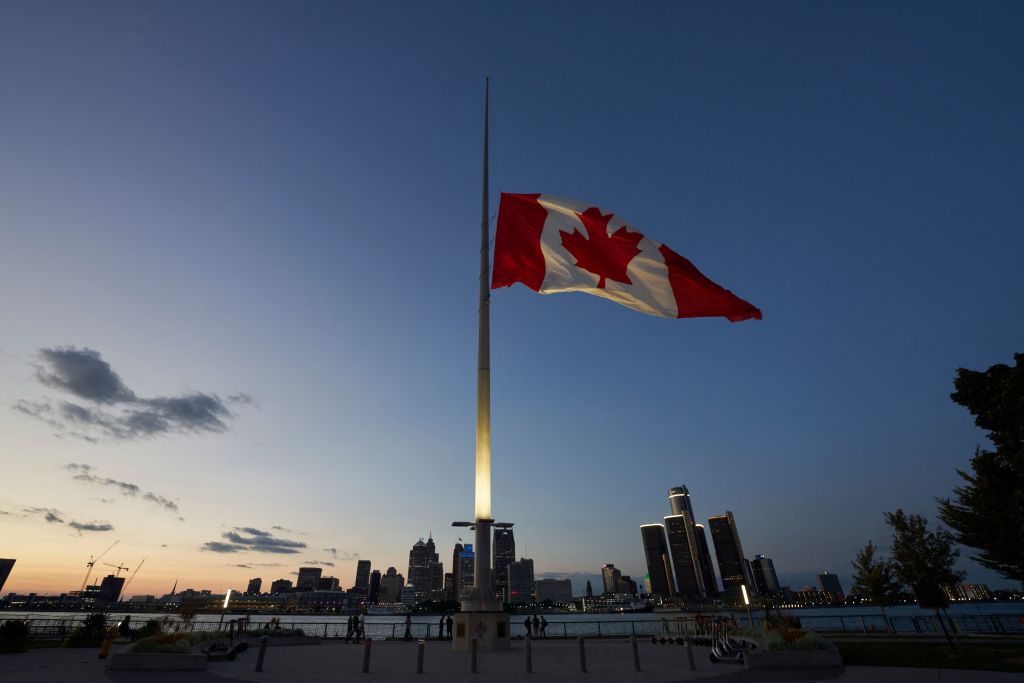Canada’s Elites Are Toasting the Monarchy. Most Canadians Couldn’t Care Less.
In Canada, most citizens are indifferent to the British Crown — making the official Canadian spectacle of mass mourning for Queen Elizabeth II feel particularly ridiculous.

The Canadian flag flies at half mast to honor the late Queen Elizabeth II on the banks of the Detroit River in Windsor, Ontario, Canada, on September 13, 2022. (Geoff Robins / AFP via Getty Images)
Last weekend, while recovering from a mild concussion, I decided to tune into the Conservative Party of Canada’s leadership convention. So as not to strain my eyes, I mostly listened rather than watched the proceedings — which is probably a good thing, because actually seeing them might have caused my brain to short circuit, less from sensory overload than from a violent deluge of tweeness entering the retinas all at once. In the wake of Queen Elizabeth’s death, convention organizers reportedly toyed with the idea of rescheduling but opted instead for a “more somber” and “revised program that reflects the passing of Her Majesty the Queen.”
“Somber” isn’t quite the adjective I would use, but the planned “big confetti guns” were duly set aside, and the country’s late constitutional monarch was afforded a characteristically treacly send-off. Since the 1980s, Canada’s heavily Americanized conservative movement has steadily taken on most of the Republican Party’s worst features while somehow, apparently, managing to leave the actual republicanism out.
Though there were many highlights, the real coup de grâce for me came courtesy of the event’s surreally weird saxophone-violin rendition of “God Save the Queen.” Watch it for yourself, and you’ll see what begins as a blandly traditional performance crescendo into a postmodern finale of improvisation and synth accompaniment. Maybe it’s the recent head injury, but wailing jazz arpeggios radiating electronic fuzz connote “deferent sobriety” to me about as well as a rendering of “Ode to Joy” played on a farting trombone. To anyone still laboring under the delusion that the rituals of monarchy represent some romantic linkage to a more ordered and dignified past, well, I have a handful of magic beans to sell you.
In illustrating the breathtaking strangeness of Canadian officialdom’s response to recent events overseas, the Tory convention is only one possible anecdote among many. Prime Minister Justin Trudeau’s mawkishly pious tribute on the day of the Queen’s death basically set the tone for everything that has come since. Personally, I think anyone with even a modicum of national pride should feel deeply embarrassed on the country’s behalf. In my own ancestral homeland, which just happens to be Great Britain, the institution of monarchy does at least remain a somewhat visible feature of life. In Canada, we truly have no excuse.
Again, perhaps the recent blow I sustained to the head has compromised my judgment, but among average citizens I’ve seen little that even remotely resembles our national elite’s precious behavior. For a tiny cadre of insufferable royalist Twitter pedants, the past few days have been a veritable Woodstock. According to the actual polling, though, the reigning emotion for most Canadians continues to be indifference. As of March, empirical evidence suggested that the proportion who maintain an active preference for monarchy numbers only one in five. And as per data from earlier this week:
A new poll suggests that while many Canadians plan to watch Queen Elizabeth II’s funeral next week, the vast majority have not been personally impacted by her passing and feel no attachment to the monarchy. The poll from Leger and the Association of Canadian Studies also found that while some Canadians are happy about King Charles III taking the throne and others are not, most are largely indifferent to Canada’s new head of state.
Indifference, of course, is an inherently passive sentiment. If most Canadians aren’t monarchists, I’ll willingly concede that most are not raging Jacobins either. But when it comes to something as basic as a country’s constitutional architecture — Canada is still a constitutional monarchy in which political power is officially exercised under the aegis of the Crown — a feeling of passivity among millions of people is nevertheless pretty damned instructive.
Polled by the Dominion Institute in 2009, a full three-quarters of Canadians couldn’t correctly identify their head of state — which I think was less an example of public illiteracy than it was a blunt statement about reality. As the past several days have rather absurdly shown, the liturgy of royalism remains embedded in Canada’s political institutions, but the monarchy itself has entirely disappeared as a living or breathing feature of its civic and cultural life. Even among elites, the official performance of “national mourning” mostly looks like kayfabe.
For my part, I hold more or less the standard socialist view about kings and queens. I think the idea of a hereditary political order, even a symbolically hereditary one, offends the most basic humanist sensibilities and is incompatible with any genuine belief in equality. You don’t need monarchy if you have a democratic state with universal suffrage, and even a bare-bones liberal version of such a state is infinitely preferable to anything that asks us to locate the source of political authority in the corporeal body of a landed aristocrat sitting on a throne.
In any case, I certainly hope that my fellow Canadians enjoy the forthcoming federal holiday haphazardly announced in response to the Queen’s death. But I don’t expect many will be thinking too much about the actual occasion for it.